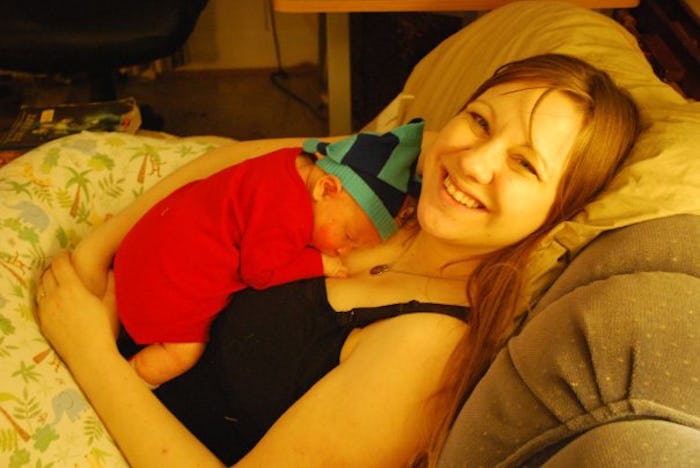Life

Breastsleeping Saved My Newborn, Period
My husband and I always knew we would co-sleep. Before my oldest son Blaise was born, we researched attachment parenting and learned about the benefits of co-sleeping, so we set up a safe co-sleeping environment: we dropped the bed to the floor, pulled it away from the wall, got rid of all our fluffy blankets and kept only a few pillows. Then when he came home from the hospital, we stuck him in an arm’s reach co-sleeper and tried to get some shut-eye.
Blaise whined. He whimpered. He squirmed in his swaddle. I sighed, picked him up, and nursed him back to sleep. Then I set him back in the co-sleeper, and a few hours later, the cycle began anew. I was so tired. I’d had a harrowing labor, followed by three days of people waking me up every two hours to take my blood pressure or just wander in and out of my hospital room. I needed some serious sleep. I figured that there had to be a better way, but I didn't know what it was.
Then something began to happen. Immediately after Blaise finished nursing, I'd promptly fall asleep, as would he. And a few hours later, when he'd begin to squirm and stir again, I'd pull him up onto my stomach, flip him to the other side, pull down my shirt, latch him to the other boob, then go right back to sleep. At three days old, he started rooting for the nipple on his own and nursing all night, even when I was asleep. At the time, I didn't know there was a term for what we were doing, breastsleeping, a combination of co-sleeping and breastfeeding. All I knew was that he was getting more food, and I was getting more sleep.
After Blaise passed that annoying newborn period when they get their days and nights mixed up, that’s how we slept every single night. He had terrible reflux, so I'd nurse him to bed and put him upright in a swing. This gave my husband and I some much-needed adult time. I might nurse him once more before bed, and return him to the swing. That gave me a precious chance to sleep alone. But once he squawked, he was in bed, nursing while we both slept, for the rest of the night.
“How is he sleeping?” people would ask me in hushed tones, as if inquiring about a dying relative.
“I have no clue,” I’d say.
As a new mom, I expected that I'd get no sleep. Yet here I was, sleeping like an angel every night. People were shocked. “How is he sleeping?” they'd ask me in hushed tones, as if inquiring about a dying relative.
“I have no clue,” I’d say, because I didn’t. I knew that once he woke to nurse, he drifted back to sleep. But I had no idea how many times he woke up at night. I had no idea how much milk he took in. I slept through the whole thing. Well, not through the flip-the-baby-over part. But that only took a second, and then I was back in dreamland.
Blaise was slow to gain weight because of his reflux, a fairly common side effect for breastfed babies. His pediatrician, who knew we used safe co-sleeping practices, advised that we take him into our bed at night so he could get more calories. I won’t say that Blaise bulked up, but he did keep on more weight than he would have if we’d have stuck him in a crib. We weren't doing anything magical. He simply ate more often.
It’s the equivalent of making a hoagie while sleepwalking.
After Blaise stopped getting his days and nights confused, I got a full eight hours of sleep every night until I had my next baby. Once that one got his days and nights down, I had another full eight hours until baby number three, who took two weeks to figure out when humans should be awake and when they should sleep. But once he got that down, I slept for eight hours at a stretch. With a newborn and two toddlers, I was sleeping through the night. Sure, that meant the toddlers crawled into bed with my husband and me, but at least we were sleeping.
Breastsleeping is not for everyone. For starters, there's some research to suggest that bed-sharing increases the risks of Sudden Infant Death Syndrome (SIDS), although Dr. James McKenna, the director of the Mother-Baby Sleep Laboratory at the University of Notre Dame, claims that when practiced safely, bed-sharing is beneficial for mothers and babies. But for those who make the choice to bed-share, breastsleeping is wonderful. It allowed my son to feed more often, which ensured he gained more weight. Plus, it's efficient: Baby can eat in his sleep, and you can nurse in your sleep. It’s the equivalent of making a hoagie while sleepwalking, and someone snarfing it in between snores.
I'm so glad we discovered breastsleeping. I wouldn’t know how to parent a newborn without it. All that up and down, up and down — I would collapse of sleep deprivation. Breastsleeping prevents that. So as long as you've done your research and your bed is safe, it’s worth a try.